Reagent strips - Study guides, Class notes & Summaries
Looking for the best study guides, study notes and summaries about Reagent strips? On this page you'll find 146 study documents about Reagent strips.
Page 2 out of 146 results
Sort by
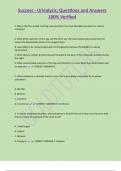
-
Success - Urinalysis; Questions and Answers 100% Verified
- Exam (elaborations) • 22 pages • 2024
- Available in package deal
-
- $13.99
- + learn more
Success - Urinalysis; Questions and Answers 100% Verified 1. Why is the first-voided morning urine specimen the most desirable specimen for routine urinalysis? A. Most dilute specimen of the day and therefore any chemical compounds present will not exceed the detectability limits of the reagent strips B. Least likely to be contaminated with microorganisms because the bladder is a sterile environment C. Most likely to contain protein because the patient has been in the orthostatic pos...
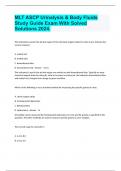
-
MLT ASCP Urinalysis & Body Fluids Study Guide Exam With Solved Solutions 2024.
- Exam (elaborations) • 27 pages • 2024
-
- $8.69
- + learn more
The indicator(s) used in the pH test region of the chemical reagent strips for urine is/are: (Choose ALL correct answers) A. methyl red B. methyl blue C. bromothymol blue D. bromothymol red - Answer A & C; The indicator(s) used in the pH test region are methyl red and bromothymol blue. Typically on most chemical reagent strips for urine pH, with an increase in urinary pH, the indicators bromothymol blue and methyl red, changes from orange to green and blue. Which of the following is...
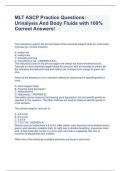
-
MLT ASCP Practice Questions: Urinalysis And Body Fluids with 100% Correct Answers!
- Exam (elaborations) • 20 pages • 2024
- Available in package deal
-
- $15.49
- + learn more
The indicator(s) used in the pH test region of the chemical reagent strips for urine is/are: (Choose ALL correct answers) A. methyl red B. methyl blue C. bromothymol blue D. bromothymol red - ANSWER-A & C; The indicator(s) used in the pH test region are methyl red and bromothymol blue. Typically on most chemical reagent strips for urine pH, with an increase in urinary pH, the indicators bromothymol blue and methyl red, changes from orange to green and blue. Which of the following is no...
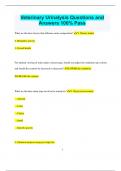
-
Veterinary Urinalysis Questions and Answers 100% Pass
- Exam (elaborations) • 37 pages • 2024
- Available in package deal
-
- $10.99
- + learn more
Veterinary Urinalysis Questions and Answers 100% Pass What are the three factors that influence urine composition? 1. Dietary intake 2. Metabolic activity 3. Overall health For optimal viewing of urine under a microscope, should you adjust the condenser up or down, and should the contrast be increased or decreased? LOWER the condenser INCREASE the contrast What are the three main steps involved in urinalysis? 1. Physical assessment: - Amount - Color - Clarity - Smell - S...
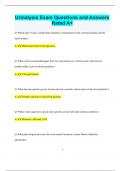
-
Urinalysis Exam Questions and Answers Rated A+
- Exam (elaborations) • 69 pages • 2024
- Available in package deal
-
- $11.99
- + learn more
Urinalysis Exam Questions and Answers Rated A+ Q: Which type of urine sample helps minimize contamination from external genitalia and the distal urethra? A: Midstream Clean Catch specimen Q: What is the recommended upper limit for total protein in a 24-hour urine collection for healthy adults as per textbook guidelines? A: 150 mg/24 hours Q: What does the specific gravity of urine directly correlate with in terms of dissolved particles? A: Number and mass of dissolved parti...
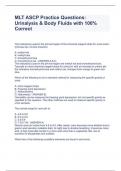
-
MLT ASCP Practice Questions: Urinalysis & Body Fluids with 100% Correct
- Exam (elaborations) • 20 pages • 2023
-
Available in package deal
-
- $12.99
- + learn more
MLT ASCP Practice Questions: Urinalysis & Body Fluids with 100% CorrectMLT ASCP Practice Questions: Urinalysis & Body Fluids with 100% CorrectMLT ASCP Practice Questions: Urinalysis & Body Fluids with 100% CorrectMLT ASCP Practice Questions: Urinalysis & Body Fluids with 100% CorrectMLT ASCP Practice Questions: Urinalysis & Body Fluids with 100% Correct The indicator(s) used in the pH test region of the chemical reagent strips for urine is/are: (Choose ALL correct answers) A. methyl red B. ...
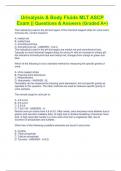
-
Urinalysis & Body Fluids MLT ASCP Exam || Questions & Answers (Graded A+)
- Exam (elaborations) • 20 pages • 2024
-
Available in package deal
-
- $11.99
- + learn more
Urinalysis & Body Fluids MLT ASCP Exam || Questions & Answers (Graded A+) Urinalysis & Body Fluids MLT ASCP Exam || Questions & Answers (Graded A+) The indicator(s) used in the pH test region of the chemical reagent strips for urine is/are: (Choose ALL correct answers) A. methyl red B. methyl blue C. bromothymol blue D. bromothymol red - ANSWER - A & C; The indicator(s) used in the pH test region are methyl red and bromothymol blue. Typically on most chemical reagent strips for urine ...
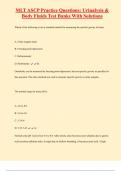
-
MLT ASCP Practice Questions: Urinalysis & Body Fluids Test Banks With Solutions
- Exam (elaborations) • 47 pages • 2024
- Available in package deal
-
- $26.99
- + learn more
MLT ASCP Practice Questions: Urinalysis & Body Fluids Test Banks With Solutions Which of the following is not a standard method for measuring the specific gravity of urine: A. Urine reagent strips B. Freezing point depression C. Refractometry D. Hydrometry B; Osmolality can be measured by freezing point depression, but not specific gravity as specified in this question. The other methods are used to measure specific gravity in urine samples
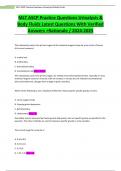
-
MLT ASCP Practice Questions Urinalysis & Body Fluids Latest Questions With Verified Answers +Rationale / 2024-2025
- Exam (elaborations) • 26 pages • 2024
-
Available in package deal
-
- $11.00
- + learn more
MLT ASCP Practice Questions Urinalysis & Body Fluids Latest Questions With Verified Answers +Rationale / The indicator(s) used in the pH test region of the chemical reagent strips for urine is/are: (Choose ALL correct answers) A. methyl red B. methyl blue C. bromothymol blue D. bromothymol red [Ans: - A & C; The indicator(s) used in the pH test region are methyl red and bromothymol blue. Typically on most chemical reagent strips for urine pH, with an increase in urinary pH, the indica...
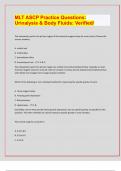
-
MLT ASCP Practice Questions: Urinalysis & Body Fluids: Verified/| LATEST UPDATE | EXAM PREDICTION QUESTIONS |
- Exam (elaborations) • 28 pages • 2024
-
Available in package deal
-
- $10.49
- + learn more
MLT ASCP Practice Questions: Urinalysis & Body Fluids: Verified/ The indicator(s) used in the pH test region of the chemical reagent strips for urine is/are: (Choose ALL correct answers) A. methyl red B. methyl blue C. bromothymol blue D. bromothymol red - -A & C; The indicator(s) used in the pH test region are methyl red and bromothymol blue. Typically on most chemical reagent strips for urine pH, with an increase in urinary pH, the indicators bromothymol blue and methyl red, chan...

That summary you just bought made someone very happy. Also get paid weekly? Sell your study resources on Stuvia! Discover all about earning on Stuvia


